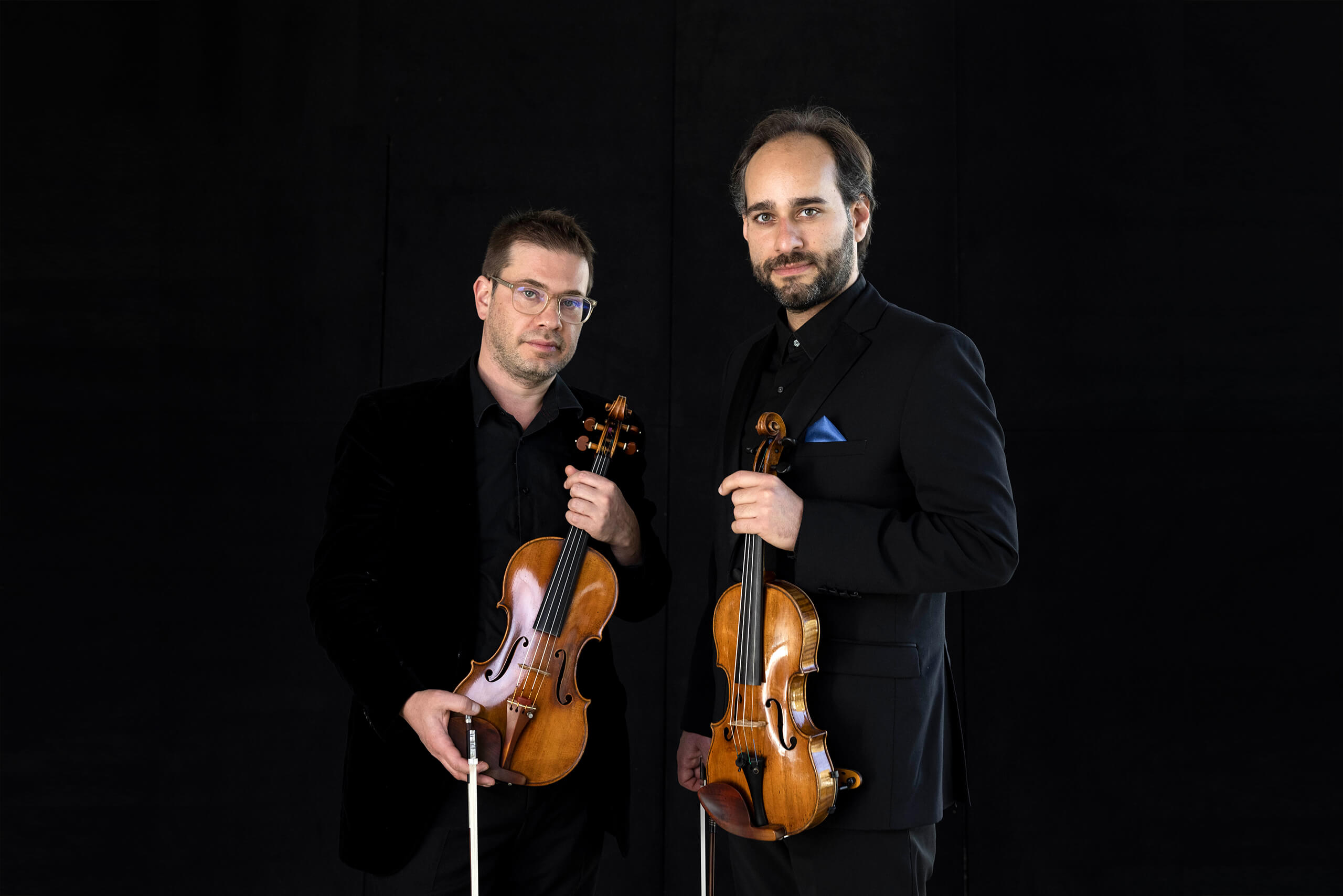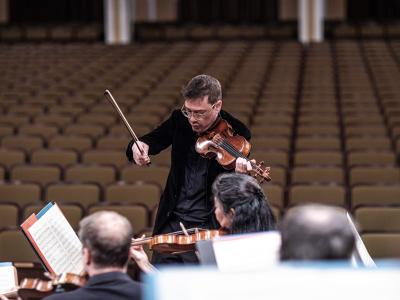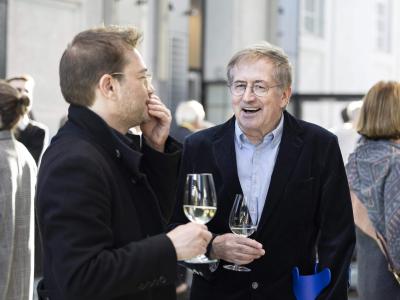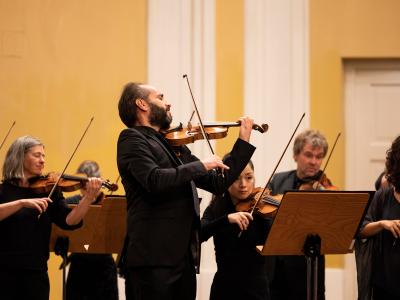Artistic Direction
CAMERATA was founded with Bernhard Paumgartner's vision of creating an ideal sound through the individual responsibility of each musician in the highest sense of the community. Sándor Végh's credo of approaching each piece as if it were chamber music played by a string quartet still characterises the sound and playing style of CAMERATA today.
In 2016, as a logical consequence of this chamber orchestral tradition, the orchestra decided to take the leadership into its own hands. Under the artistic direction of the "Primae inter pares", CAMERATA has been playing under its own leadership and democratic self-image with its concertmasters Gregory Ahss and Giovanni Guzzo ever since.
THE CONCERTMASTER, THE UNKNOWN ENTITY?
An interview with the two concertmasters of CAMERATA: Giovanni Guzzo and Gregory Ahss. Conducted by Hannes Eichmann.
The audience usually thinks he's a primus inter pares who takes over the tuning, shakes the conductor's hand and that's it. You are both not only concertmasters with the wonderful CAMERATA Salzburg, but you are also professional concertmasters with various ensembles, apart from being soloists, teaching, etc. But you chose this obscure profession at some point. What is so attractive about it for you?
Gregory Ahss: I wouldn't say it was a conscious decision, it just happened that way. I am a musician first and foremost. And at the same time, there are many aspects to the position of concertmaster that have nothing to do with music. That's actually what I find particularly interesting: you are responsible for many things, for the team spirit, for the good atmosphere, in many ways the group is a reflection of yourself. When I see less happy faces, I realise that I'm not radiating enough good vibes. As a concertmaster, you have to create a good working atmosphere. You are a musician, but 80 to 90 per cent is pure psychology.
Giovanni Guzzo: Exactly, a large part of our work is the non-public part. I think a lot of people think "he's sitting at the front because he's the best of them all", but it's more about inspiring the others and, if there is a conductor, also being a kind of bridge between him and the orchestra. I see my role more as an inspiration for the people around me. It's a bit like a football team: everyone is the same all the time and there's always one person who has to take on the role of inspiring the others and getting the best out of them. That's how you get the best result.
You describe the bridge between the conductor and the ensemble: you are the person who sits closest to the conductor and who he talks to. But CAMERATA is an ensemble that very often plays without a conductor, so it's a completely different story, isn't it?
Gregory Ahss: Playing without a conductor is completely different. It requires much more responsibility, more knowledge and reaction to different things. With the orchestra, you can have the most amazing experiences when making music, just like with chamber music. I also believe that as a leader, even with a conductor, you have to have a complete strategy for the interpretation of the piece, for the overall picture that emerges even more clearly without a conductor.
Giovanni Guzzo: One of the very special things about CAMERATA and what we do is that we have not replaced the role of the conductor with the role of a leader, but that we have replaced it, so to speak, and given it to each individual. This is a kind of democracy in which everyone can and may have an idea, a great model. And if there is no conductor, then of course our role as leaders is much more about organising all these ideas that everyone represents. This creative process is fascinating. In the first rehearsals, each musician comes with an idea of what the piece is about and then it's about shaping it, a bit like moulding a sculpture that turns: you just steer it a little. That's real magic.
But ultimately you are the ones who decide which interpretation to choose: tempo, agogics, phrasing. Even if there are suggestions from the orchestra to play a repertoire piece in a certain tradition. In the end, this decision lies with the leading concertmaster.
Giovanni Guzzo: That's part of the psychological challenge of what we do. I think that's what Gregory meant, it's not so much the playing, but you also have to be skilful enough to make people feel that they're bringing it - and moulding them at the same time. In a documentary about the great conductor Claudio Abbado, with whom Gregory worked so much, one of his musicians said, "the great thing was that he gave us the impression that we were all in control, but that's an illusion. He was the one who moulded us." That's part of the magic and also part of the challenge, I think.
Gregory Ahss: And it's not just about making music. If you were to act like that as a company boss, your employees would think, "Wow, finally we're doing something that's just for us." They work for him, but he gives them that feeling. And that's when people give their best because they're working for themselves. It's all response, basically we need to be able to get the best out of people and utilise it. So, in many ways we are reacting to a split second, we have to react to what people have to offer and maybe make it our own or make our idea their own.
The legendary violinist Sándor Végh shaped his Camerata Academica for almost 20 years as a kind of concertmaster on the podium. He never really studied conducting but was the principal violinist of a string quartet. I remember him once saying about his work: "The joy lies in playing together, in listening together and that is much greater than beating time. Anyone can do that."
Giovanni Guzzo: Definitely, yes. I think the perfect orchestra is ultimately great chamber music. A great chamber music experiment in which everyone listens to everyone else. We are returning to democracy, a real democracy, where everyone has a say and everyone can express their opinion. When you see what Sándor Végh, who didn't have the cleanest conducting technique, got out of the orchestra musicians, it's incredible. He really was poetry through music. One of the great technicians and conductors, Carlos Kleiber, was once asked: "Maestro, who should I go to in order to learn?" and he said: "Go to Sándor Végh, go and learn from him, because he is the true musician." It really was the case that under Végh, everyone has to give their all in every note and you can hear that. And that's why we still listen to his recordings, that's why they're still legendary.
Gregory Ahss: That's the difference between a good craftsman and an artist. You can learn the craft of conducting. But are you also an artist? If you're not on fire, then it doesn't matter where you stand technically. When I first played under the baton of Claudio Abbado, I was amazed at his conducting technique. I grew up with Zubin Mehta and they both studied with the same teacher. But at first, I didn't understand anything about Abbado's conducting. Later I realised that this was a conscious decision on his part. He wanted us to think for ourselves and to listen. That is art. Then so-called technical conducting is no longer important. It's nice if you can do it, but Sándor Végh is the best example: it's not about waving your hands, it's about something else: energy, eyes, communication. They were all good communicators. That's the magnet for the audience and the orchestra.





